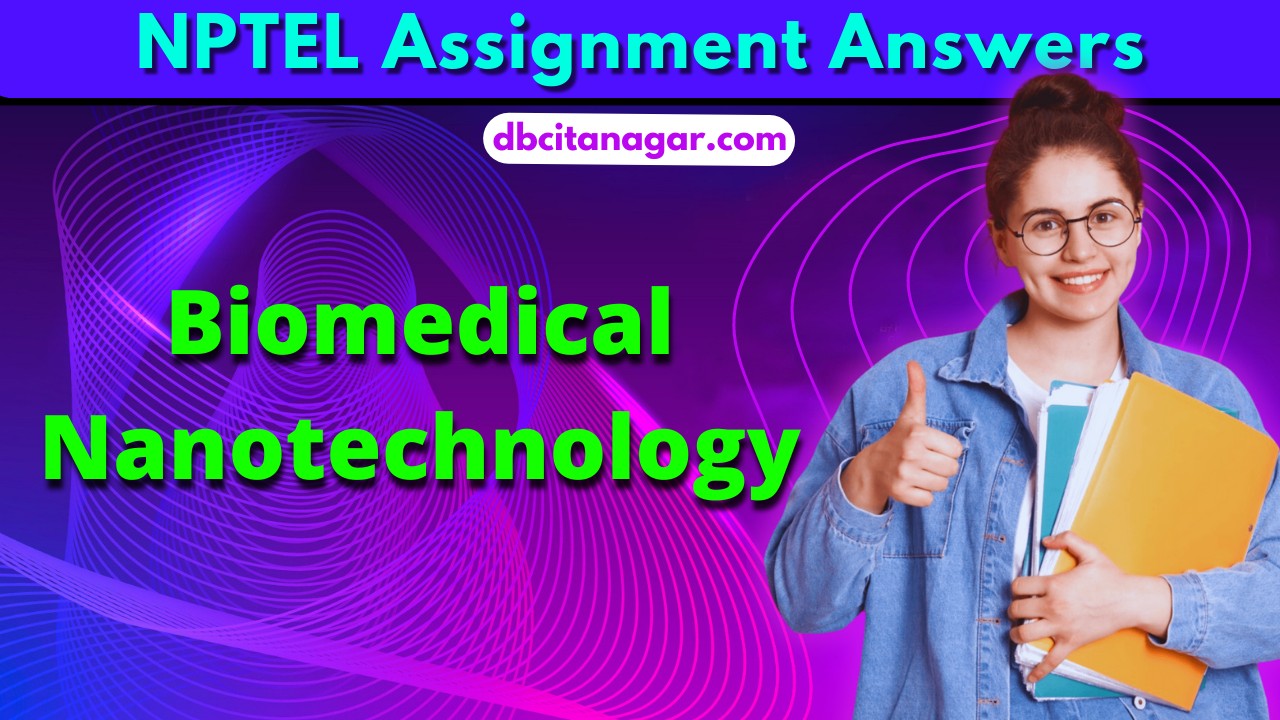NPTEL Biomedical Nanotechnology Week 2 Assignment Solutions

NPTEL Biomedical Nanotechnology Week 2 Assignment Answers 2023
2. The tendency of nonpolar substances to aggregate in the aqueous solution and exclude water molecules
- Metal Ligand Interaction
- Hydrophobic Interaction
- Hydrophilic Interaction
- Van der Waals Interaction
Answer :-For Answer Click Here
2. Name a physical technique used to determine the thermodynamic parameters of interactions in a solution
Answer :- For Answer Click Here
3. Molecular model of lipid like peptides: A6D can be read as
- peptides have 6 hydrophobic alanine residues from the N-terminus followed by negatively charged aspartic acid residue
- peptides have 6 hydrophobic arginine residues from the N-terminus followed by negatively charged aspartic acid residue
- peptides have 6 hydrophobic alanine residues from the N-terminus followed by positively charged D-lysine residue
- peptides have 6 hydrophobic arginine residues from the N-terminus followed by positively charged D-lysine residue
Answer :- For Answer Click Here
4. Technique used for capturing specific target proteins and mapping their binding epitope containing peptide
- Lin’s technique
- Brown’s technique
- Fen’s technique
- Mark’s technique
Answer :- For Answer Click Here
5. Fine grades of (i) polydextran beads are most commonly used for column chromatographic separation of (ii), while medium/coarser grades are required for (iii).
Choose the correct combination:
- i.-Sephadex G550, ii-LUV, iii-SUV
- i.-Sephadex G-50, ii-LUV, iii-SUV
- i.-Sephadex G-50, ii-SUV, iii-LUV
- i.-Sephadex G-550, ii-SUV, iii-LUV
Answer :- For Answer Click Here
6. Which of the following is not the top-down technology for fabrication of the bioactive loaded SLNs for food application?
- Emulsification method
- High-pressure homogenization
- Microfluidization
- Membrane contactor method
Answer :- For Answer Click Here
7. Molecular communication follows the steps mentioned below as per their order of occurrence:
- Encoding-Sending-Propagation-Decoding-Receiving
- Encoding-Propagation-Sending-Receiving-Decoding
- Encoding-Sending-Propagation-Receiving-Decoding
- Encoding-Propagation-Decoding-Sending-Receiving
Answer :- For Answer Click Here
8. Consider the following steps in bacterial chemotaxis:
a. Chemoreceptors transmit information to a central processing system
b. Central processing integrates many inputs and sends a signal to control flagellar motors
c. Attractants/repellents bind to chemoreceptors
Choose the appropriate sequence of events
- c – b – a
- c – a – b
- b – a – c
- b – c – a
Answer :- For Answer Click Here
9. The following effects are observed due to the functionalization of carbon nanotubes:
i. Purity enhances
ii. Water solubility decreases
iii. Aggregation of the individual CNTs decreases
iv. Biocompatibility enhances
Choose the incorrect/irrelevant option:
- i, iv
- i, ii
- iii, iv
- i, iii, iv
Answer :- For Answer Click Here
10. Assertion (A): Carbon nanotubes are highly soluble in water.
Reason (R): Functionalization of carbon nanotubes has no impact on its water solubility.
- Both A and R are true and R is the correct explanation of A
- Both A and R are true but R is not the correct explanation of A
- A is true but R is false
- Both A and R are false
Answer :- For Answer Click Here
| Course Name | Biomedical Nanotechnology |
| Category | NPTEL Assignment Answer |
| Home | Click Here |
| Join Us on Telegram | Click Here |


![NPTEL Business And Sustainable Development Week 2 Assignment Answers 2023 4 [Week 1] NPTEL Business And Sustainable Development Assignment Answers 2023](https://dbcitanagar.com/wp-content/uploads/Business-And-Sustainable-Development-150x150.png)


